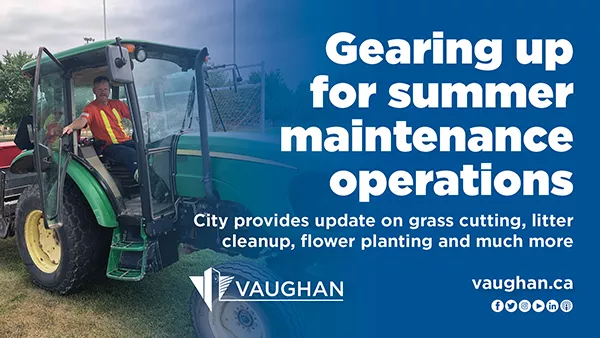Gearing up for summer maintenance operations
Spring is quickly turning into
summer, and the City of Vaughan’s maintenance operations for the new season are
already underway to help keep the community safe, clean and beautiful. Here
is an update on the work:
Street sweeping and road maintenance
City crews performed their annual city-wide street sweeping efforts from March to May. More than 2,475 bags of litter and debris have been removed from city boulevards (a total of 130 hectares).
City crews have repaired 2,800 potholes on Vaughan streets this year, with another round of maintenance beginning this month. The City also inspects more than 1,000 lane-kilometres of sidewalks annually for any defects and will schedule repairs; curb and sidewalk repairs began in April.
Annual grass cutting launched in May with a total of 13 rotations, each running for two weeks.
Park litter and debris cleanup
The City’s spring-cleaning blitz began in March with the collection of litter from Vaughan’s parks and open spaces – a total of 480 bags of litter have been collected so far. These efforts continue alongside weekly park garbage collection and turf-cutting, which occurs bi-weekly.
Starting this month, staff will begin spraying bee and wasp nests found in City parks and on playgrounds.
Horticulture refresh
Shrub beds and planting bed maintenance (pruning, mulching, weeding, litter cleanup and watering) continued to run on a regular rotation throughout the spring. A total of 750 hanging baskets and 700 planters began to appear across the city on Victoria Day – Monday, May 23 – and will continue through to mid-June.
Forestry maintenance
Regular tree maintenance is currently operating at full capacity. A total of 15,000 trees have been pruned so far in 2022. Any hazards that need to be removed, such as trees or branches, are responded to in a priority sequence. Additional crews have been deployed to continue to clean up fallen trees and debris throughout Vaughan due to the storm on Saturday, May 21. Your patience is appreciated while this work continues.
To help control the spongy moth population, the City began inspections of more than 8,000 City-owned trees in April throughout heavily infested areas. Staff have effectively removed egg masses from more than 3,000 trees so far this season. In May, the City began applying some Btk sprays (a biological control product that is non-toxic to animals, humans, plants and most other insects) from the ground at select park locations. Also in May, the City installed barrier bands on vulnerable trees in street and park locations with high levels of infestation. In June, staff will be injecting TreeAzin™ (a biological control product) in trunks of many heritage trees and priority hotspot woodlot locations, as well as continuing to install barrier bands.
Watch this step-by-step video on how to install burlap bands to help you protect trees on your private property.
Stormwater and wastewater services
The first round of litter pickup and grass cutting at the City’s stormwater management ponds is well underway and will continue in the summer months. During this seasonal maintenance, three rounds of litter pickup and grass cutting are completed at each pond. Litter pickup is undertaken in all non-aquatic areas before grass cutting, which takes place along the perimeter of the pond. Over 1,000 bags of litter and debris have been collected from the City’s stormwater ponds so far this year.
Throughout April, the City removed accumulated sediment and debris from the bottom of 10,000 catch basins as part of Environmental Services’ preventative maintenance programming. Catch basins in industrial areas are cleaned annually and catch basins in residential areas are cleaned on a three-year rotation. Additionally, routine sewer inspection and cleaning is ongoing; wastewater and stormwater sewers are inspected on a 10-year rotation and wastewater sewers are cleaned on a three-year rotation.
Water maintenance
In April, the City began its annual inspection of fire hydrants and continues to perform flushing of watermains and valve cycling to keep pipes clean, clear and operational. Staff have inspected 4,212 hydrants and cycled 1,166 valves. The City has also attended water shut-off and turn-on requests which increase during the spring and summer months. Non-emergency water shut-off and turn-on requests must be submitted four to six weeks before the service is required.
These maintenance efforts demonstrate how Vaughan’s Public Works professionals continue to go above and beyond to provide essential services that safeguard and enhance the quality of life in this growing city. This work reflects many priorities in the 2018-2022 Term of Council Service Excellence Strategic Plan, including Active, Safe and Diverse Communities; Environmental Stewardship; Citizen Experience; and Operational Performance.
For updates and news as they happen, subscribe to Vaughan News and follow the official corporate channels on Twitter, Facebook, Instagram and LinkedIn.
-30-

